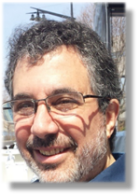Mark Tuckerman
Professor and Chair
New York University
Department of Chemistry
+Amol Ajinkya Memorial Fund Lecture
Co-Sponsored with UB Dept. of Chemistry
Live broadcast available:
ZOOM Link
PW: UBCBE1
Topology, Molecular Simulation, and Machine Learning as Routes to Exploring Structure and Phase Behavior in Molecular and Atomic Crystals
Organic molecular crystals frequently exist in multiple forms known as polymorphs. Structural differences between crystal polymorphs can affect desired properties, such as bioavailability of active pharmaceutical formulations, lethality of pesticides, or electrical conductivity of organic semiconductors. Such differences are further complicated by the possibility that some of these structures can occur in the form of hydrates or solvates. Crystallization conditions can influence polymorph selection, making an experimentally driven hunt for polymorphs difficult. These efforts are further complicated when polymorphs initially obtained under a particular experimental protocol “disappear” in favor of another polymorph in subsequent repetitions of the experiment. Theory and computation can, therefore, potentially play a vital role in mapping the landscape of crystal polymorphism. Traditional methods for predicting crystal structures and investigating solid-solid phase transformation behavior face their own challenges, and therefore, new approaches are needed. In this talk, I will show, by leveraging concepts from mathematics, specifically geometry and topology, and statistical mechanics in combination with techniques of molecular simulation, and machine learning, that new paradigms are emerging in our ability to predict molecular crystal structures and determine kinetics of polymorphic phase transformations.
ZOOM Link
PW: UBCBE1
Bio
Mark Tuckerman obtained his B.S. in physics from the University of California at Berkeley in 1986 and his Ph.D. from Columbia University in 1993, working in the group of Bruce J. Berne. From 1993-1994, he held an IBM postdoctoral fellowship at the IBM Forschungslaboratorium in Rüschlikon, Switzerland in the computational physics group of Michele Parrinello. From 1995-1996, he held an NSF postdoctoral fellowship in Advanced Scientific Computing at the University of Pennsylvania in the group of Michael L. Klein. He is currently Professor of Chemistry and Mathematics at New York University. His research program spans a variety of topics including the use of theoretical and computational chemistry techniques to study electrolyte liquids and model AEM and PEM environments, the development of large time-step algorithms for molecular dynamics, free-energy based enhanced sampling tools for predicting the conformational equilibria of complex molecules and the exploration of structure and polymorphism in molecular crystals, and development of machine learning models for electronic structure theory and statistical mechanics applications. Honors and awards include the Japan Society for the Promotion of Science Fellowship, the Friedrich Wilhelm Bessel Research Award from the Alexander von Humboldt Foundation, the Camille Dreyfus Teacher-Scholar Award, an NSF CAREER Award, and the NYU Golden Dozen Teaching Excellence Award, the Andreas C. Albrecht Lectureship from Cornell University, the Institute Lectureship from the Indian Institute of Technology, Kanpur, election as a Fellow of the AAAS, and a Dreyfus award for Machine Learning in the Chemical Sciences and Engineering. He is currently serving as Chair of the Department of Chemistry at NYU.
Wednesday, October 19, 2022
- Time: 11:00 AM
- Location: 206 Furnas Hall
- Seminar Flyer

Mark Tuckerman
Professor and Chair
Department of Chemistry
New York University